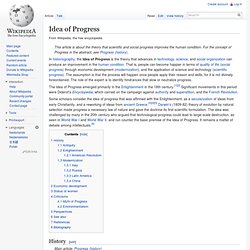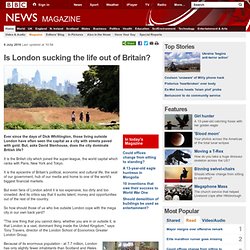

Idea of Progress. In historiography, the Idea of Progress is the theory that advances in technology, science, and social organization can produce an improvement in the human condition.

That is, people can become happier in terms of quality of life (social progress) through economic development (modernization), and the application of science and technology (scientific progress). The assumption is that the process will happen once people apply their reason and skills, for it is not divinely foreordained. The role of the expert is to identify hindrances that slow or neutralize progress. The Idea of Progress emerged primarily in the Enlightenment in the 18th century.[1][2] Significant movements in this period were Diderot's Encyclopedia, which carried on the campaign against authority and superstition, and the French Revolution. History[edit] Antiquity[edit] Historian J. Smart mob. Smart mob on occasion of United Nation's 'Children's Day'.

Vienna, Austria, in 2010-11-20. A smart mob is defined as a group that, contrary to the usual connotations of a mob, behaves intelligently or efficiently because of its exponentially increasing network links, enabling people to connect to information and others, to perform a task allowing a form of social coordination. Parallels are made to, for instance, slime molds. [citation needed] The concept was introduced by Howard Rheingold in his book Smart Mobs: The Next Social Revolution. According to Rheingold, smart mobs are an indication of the evolving communication technologies that will empower the people. These growing technologies include the Internet, computer-mediated communication such as Internet Relay Chat, and wireless devices like mobile phones and personal digital assistants.
There is a tendency to keep the dynamics of smart mobbing 'covert', and not to discuss such incidents on the internet. Early instances[edit] Is London sucking the life out of Britain? 6 July 2010Last updated at 10:54 Ever since the days of Dick Whittington, those living outside London have often seen the capital as a city with streets paved with gold.

But, asks David Stenhouse, does the city dominate British life? It is the British city which joined the super-league, the world capital which ranks with Paris, New York and Tokyo. It is the epicentre of Britain's political, economic and cultural life, the seat of our government, hub of our media and home to one of the world's biggest financial markets. But even fans of London admit it is too expensive, too dirty and too crowded. So how should those of us who live outside London cope with the mega city in our own back yard? "The one thing that you cannot deny, whether you are in or outside it, is that London is a vast, dominant thing inside the United Kingdom," says Tony Travers, director of the London School of Economics Greater London Group. Londoners exhibit excellent queue-forming skills at a Tube station.